No products in the cart.

It has been 50 years since Nigeria’s second military head of state, General Yakubu Gowon, was overthrown in a bloodless coup in Kampala, Uganda, on July 29, 1975. In fact, it was the country’s leader, Idi Amin, who delivered the message to Gowon during a diplomatic summit in the East African country.
An unexpected radio broadcast had cut through the morning mist of Lagos to announce that Gowon had been removed from office. No single shot was fired. Overnight, Nigeria slipped from the steady hands of its longest‑serving military leader into the brisk grip of his successor, General Murtala Muhammed.
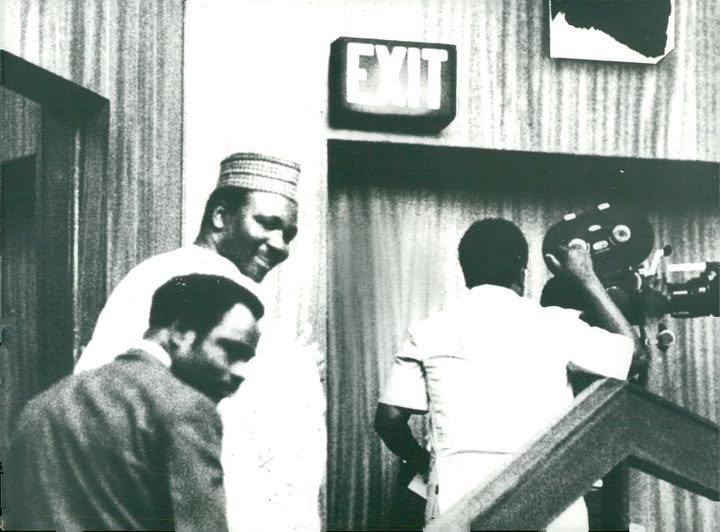
Fifty years on, the bloodless transfer of power still puzzles historians. We remember that event in this article.
Contents
Gowon’s Rise
Yakubu Gowon had risen to power nearly nine years earlier, becoming Head of State at just 31 years and nine months after the death of Major‑General Johnson Aguiyi‑Ironsi on July 29, 1966. His tenure would prove the longest of any Nigerian military ruler.
Born on October 19, 1934, in what is now Plateau State, Gowon spent his early life in modest circumstances before winning a place at Government College Zaria, today’s Barewa College, an institution that produced many of the North’s future leaders and senior officers.
Although he once imagined himself a teacher, engineer or doctor, a persuasive headmaster steered him towards soldiering. Gowon entered officer training in Teshie, Ghana, in 1954 and never looked back. By 1960, he had become the first Nigerian adjutant of the Fourth Battalion, Queen’s Own Nigerian Regiment, and three years later, he was brigade‑major with the United Nations peace‑keeping force in Congo. Steady promotions followed: major in 1962, lieutenant‑colonel in 1963, adjutant‑general of the army from 1963 to 1965, and Chief of Staff in January 1966.
When a violent mutiny toppled and killed Aguiyi‑Ironsi in July 1966, Gowon, then the most senior Northern officer, emerged as the Supreme Commander of the Armed Forces. Four years later, he wore a full general’s insignia, steering the nation through war and the difficult peace that followed—until that bloodless morning in Kampala brought his era to an abrupt end.
Gowon’s Limitations
Soon after Gowon was installed as Nigeria’s new leader, subtle flaws that would later undermine his administration began to take root. The grand title of “Supreme Commander” placed sweeping authority in his hands, yet it also created a distance between him and the rank‑and‑file soldiers whose loyalty had carried him to power. Shielded by that aura of supremacy, Gowon gradually drifted away from day‑to‑day military life, entrusting routine discipline to subordinates while he focused on overarching national issues.
Behind the scenes, real influence started to pool elsewhere. Lengthy bargaining sessions in Lagos drew regional emissaries who reported back to powerful military governors in the states. These governors seized the moment. While federal attention first centred on restoring order in the barracks and, later on, prosecuting the civil war, the men in the provincial capitals tightened their grip on local finances, patronage networks and security forces. During the war, their assertiveness went largely unnoticed; once the conflict ended and the guns fell silent, their growing autonomy became plain even to officers stationed at Army Headquarters.
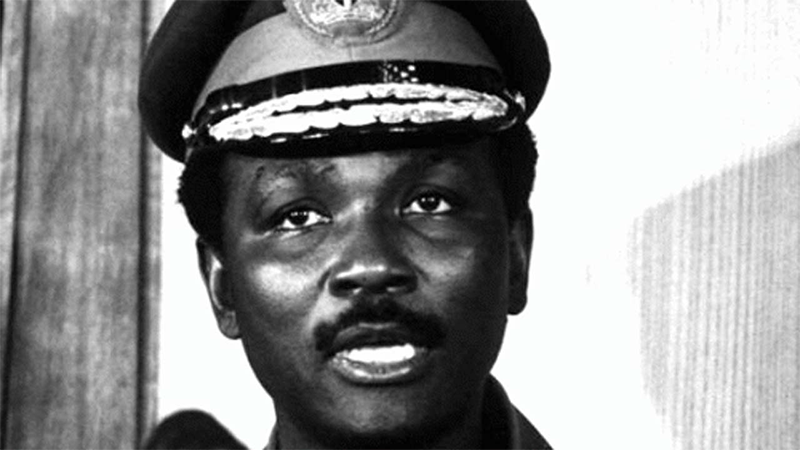
Within the federal ministries, Gowon entered unfamiliar territory. Unlike his predecessor, he lacked experience in civilian administration and often deferred to the seasoned mandarins who crowded around the Cabinet table. In October 1970, those officials helped craft a six‑year programme of post‑war reconstruction and political transition, proclaimed as a nine‑point plan. Gowon pledged that each objective—ranging from economic rehabilitation to a new constitution—would be completed by 1976, after which power would revert to elected politicians.
One plank of that agenda, the 1973 national census, soon exposed the government’s limitations. Conducted with unusual zeal, the count produced figures released in May 1974 that startled both demographers and the wider public. Nigeria’s population was said to have leapt by 43 per cent in a single decade to 79.76 million. The northern states, already suspected of inflation in 1963, now claimed nearly two‑thirds of the national total and a staggering 72 per cent rise. By contrast, the east recorded an increase of just 11 per cent, the west showed an unlikely decline of 6 per cent, and Lagos somehow swelled by 71 per cent.
Though all political activity remained officially banned, leading citizens could not contain their indignation. Editorials, lectures, and discreet memoranda denounced the census as a charade devised to tilt future revenue allocations and parliamentary seats. Gowon sought to mollify critics with promises of a post‑enumeration survey rather than a full recount and assured the country that a definitive report would appear in October 1975. That reassurance rang hollow. The follow‑up never materialised, the figures were neither revised nor withdrawn, and the episode deepened doubts about his willingness—or ability—to steer Nigeria back to credible civilian rule.
In January 1971, the Gowon administration, stung by claims that wartime spending had driven up prices, adopted the recommendations of the Chief Simeon Adebo Wages and Salaries Commission and authorised a general pay rise for public servants. The policy proved more contentious than expected. Workers in the private sector threatened strikes once the Information Commissioner, Chief Anthony Enahoro, declared that firms which had granted any increase since 1964 would be exempt. A second, even larger award with arrears followed the commission’s final report and received the Supreme Military Council’s approval in October 1971, fuelling fresh discontent among employees who felt short‑changed.

Economic headwinds gathered pace in early 1975 when international demand for crude oil suddenly dipped, cutting Nigerian output and slicing into projected revenue. Prices did rebound later that year after an intervention by the Organisation of Petroleum Exporting Countries (OPEC), yet the brief downturn exposed weaknesses in fiscal management and intensified public frustration.
A wave of strikes in May and June paralysed transport, ports, and industry, convincing many officers that the government had lost control. For those plotting change, the turbulence offered a convenient justification when they decided to remove General Gowon in July.
Corruption in the Gowon Regime
Although Gowon’s personal reputation remained largely untarnished, whispers of corruption clung to several senior figures. Investigations suggested that state governors, on average, held eight urban properties worth between forty‑nine and one hundred and twenty thousand naira apiece, alongside lucrative farms, at a time when such sums were extraordinary. The regime had attempted to police graft through measures like the Investigation of Assets Decree of 1968, yet over‑invoicing on imports, inflated construction contracts and the shipment of expired pharmaceuticals persisted.
Two important things to note about the July 29, 1975, bloodless coup are:
1. It was bloodless and,
2. It was carried out by Gowon’s kinsman, his right-hand man, Colonel Joseph Nanven Garba.
As Commander of the presidential Brigade of Guards, Garba was both a confidant of Gowon and the officer responsible for the security of the Head of State. His decision to join the conspirators, announced over Radio Nigeria, neutralised the very unit that might have resisted. During the civil war, he had recruited a special detachment from the Ngas ethnic group to protect Gowon; on the decisive morning, he ensured those men offered no opposition. With the capital calm and the barracks silent, the transfer of power was complete almost before most citizens realised anything had changed.
Against this backdrop of labour unrest, economic uncertainty and perceived official excess, a majority of officers within the armed forces concluded that new leadership was necessary.
Now, let us look at some of the factors that converged to unseat General Yakubu Gowon, Nigeria’s longest‑serving military head of state.
A Faltering Regime
Gowon had never commanded anything larger than a company. His training was first‑class, no doubt, and his staff credentials lengthy, yet he had no practical experience of leading a battalion, much less a brigade or division. His field commanders, therefore, enjoyed wide latitude to set their own pace, and when they overstepped, Gowon avoided confrontation.
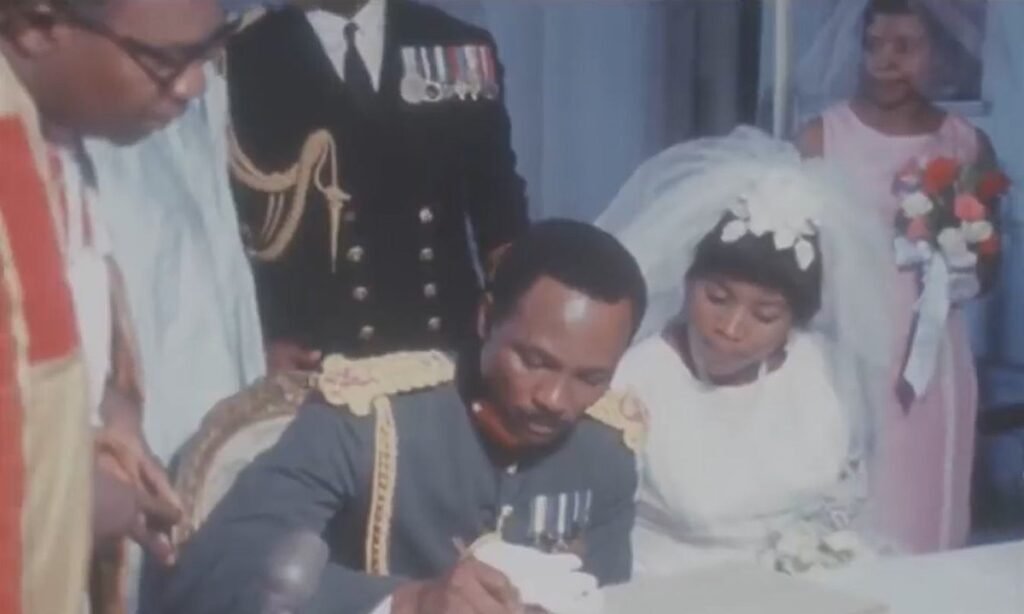
Apart from a brief tour in early 1969—two years into the conflict—he rarely visited the front. From a radio set in Dodan Barracks, he addressed commanders directly, often bypassing Army Headquarters, a habit that further loosened central control. Meanwhile, the Ministry of Defence, along with procurement teams sent abroad, became notorious for waste and inflated contracts.
Politics complicated matters. Gowon had pledged to restore civilian rule by 1976, only to withdraw the promise in his Independence Day address of October 1, 1974. That reversal deepened unease among officers already dismayed by tales of graft and by their leader’s increasing distance from service life. His marriage to Miss Victoria Zakari on April 19, 1969, staged with lavish ceremony despite wartime austerity, struck many as ill‑judged. As the couple settled into a domestic routine, Gowon’s informal contacts with key aides dwindled; even Colonel Garba, commander of the Guards Brigade and once a constant companion, now needed an appointment merely to enter his office.
Frustration spread through the barracks. Senior army officers feared that standing too close to a sinking regime might finish their own careers. Two of Gowon’s protégés—Colonels Garba and Anthony Ochefu, the Provost‑Marshal—voiced those misgivings at a private meeting in Garba’s office. Both of them concluded that the Head of State had to go, and that the army would accept nothing short of his removal. Their aim was a swift, bloodless overthrow, which would eventually unfold on July 29, 1975.
The Plan
Two weeks before the Organisation of African Unity (OAU) summit in Kampala, Uganda, General Yakubu Gowon’s Chief Security Officer, Assistant Commissioner of Police M.D. Yusuf walked into Dodan Barracks carrying a dossier thick with intercepted messages. Every trail pointed towards Colonel Joseph Nanven Garba, the tall, urbane commander of the presidential Guards Brigade who had served as Gowon’s shield since the civil‑war years.
Yusuf reported that Garba’s name had surfaced repeatedly in conversations among mid‑ranking officers who spoke with unusual confidence of an approaching “house‑cleaning.” Even more troubling, one of the conspirators had sought Yusuf out face‑to‑face, calmly informing him that the Head of State would be deposed while abroad and urging him to “do what is right” before it was too late. The Chief Security Officer saw the warning for what it was: a courtesy born of old professional respect, the sort of final hint given when the die is already cast.
Gowon listened without interrupting, thumbed through the transcripts, then shook his head. He could not accept that the man who dined at his table, organised his protection detail and shared private jokes on the veranda was plotting treason. Yusuf pressed for action, suggesting that he confront Garba under controlled circumstances, but the Head of State insisted on handling it personally.
On July 27, 1975, the morning of his departure, Gowon summoned the colonel to his residence. The exchange was brief, and he asked Garba directly, who met his gaze and denied everything. Gowon then said, “If you are involved, let it weigh on your conscience, and let no blood be shed. I must leave for Kampala anyway.” The matter ended there.
Yusuf, conscious of his limited authority inside an army camp, could only watch as the presidential aircraft rose into the hazy sky, taking the Commander‑in‑Chief beyond Nigeria’s borders for what none of them realised would be an exile of many years.
The timing of the departure could hardly have suited the plotters better. First Lady Victoria Gowon had flown to London on July 25, determined not to miss the summer sales in the city’s upscale stores despite her husband’s misgivings. Major‑General David Akpode Ejoor, the Chief of Army Staff, had already gone on leave, and a few military governors were abroad on vacation as well.
Gowon, anxious not to stir rumours, had issued no standby orders to field formations, had not placed the army on alert and had not curtailed officers’ movements. In effect, the chain of command lay slack; only the Guards Brigade in Lagos possessed the firepower and proximity to resist a strike, and its loyalty had now been quietly diverted.
With the Head of State airborne, the conspirators shifted into their final forty‑eight‑hour schedule. The Lagos International Airport was placed under discreet watch, passenger manifests were scanned for unexpected senior officers and key telephones were tapped. The plotters wisely decided against attempting to seize Gowon during the departure ceremonies; a firefight on the tarmac would have shattered any claim to a peaceful change of government. Instead, they waited until Kampala confirmed the Nigerian delegation had reached Ugandan airspace.
Overthrowing Gowon
At about 10:00 p.m. on July 28, 1975, a group of senior and middle‑ranking officers gathered at the Lagos Garrison Organisation on Kofo Abayomi Road, Victoria Island. Colonel Anthony Ochefu, Provost Marshal of the Army, chaired the meeting, while Lieutenant‑Colonel Shehu Musa Yar’Adua, commander of the 4th Guards Battalion, issued the operational orders.
Around the table sat men who would shape Nigeria’s politics for decades: Lieutenant‑Colonels Ibrahim Taiwo, Ibrahim Babangida, Muhammadu Buhari and Abdullahi Mohammed, along with Colonels Paul Tarfa, Alfred Aduloju, and, of course, Joseph Garba. Their plan followed the manual of staff colleges everywhere.

Priority targets were the Commander‑in‑Chief’s residence and office at Dodan Barracks, the Ministry of Defence, the Army, the Navy and the Air Force headquarters on Marina, the Police Force headquarters on Moloney Street and national broadcasting facilities. Secondary detachments would secure telephone exchanges, radio and television stations outside Lagos to prevent counter‑broadcasts.
Shortly after 04:00 in the morning, a final draft of the coup announcement was ready; Garba was to read it himself. At 06:00, he delivered the speech once the martial music was over.
Because Kampala lies two hours ahead of Lagos, the announcement reached the Ugandan capital at 8:00 a.m. General Gowon had risen early in his suite at the Nile Hotel and was oblivious of what was happening in Lagos. As he walked towards the Nile Mansions conference hall, Mobutu Sese Seko of Zaire delayed him for 30 minutes, discussing the situation in Angola.
After he had taken his seat inside the hall, Ugandan President Idi Amin passed a folded note to Gowon, who read it quickly; it stated that he had been deposed in a coup and a new administration had been formed. Still clinging to his belief in Garba’s loyalty, he remarked to Amin that the situation would clarify itself in due course and that his loyal commander would resist any coup attempt. However, Gowon was wrong.
The realisation that Garba had announced the coup came as a blow, yet the deposed head of state remained composed. He made a short statement acknowledging the change of government and expressing hope for Nigeria’s stability.
Throughout the afternoon, a procession of African heads of state arrived to offer sympathy: Sudan’s Jaafar Nimeiri, Ethiopia’s Mikael Andom and Kenya’s Jomo Kenyatta among them. In the evening, fresh news reached him that Brigadier Theophilus Yakubu Danjuma, whom he relied on for support, had accepted appointment as Chief of Army Staff in the new dispensation. Gowon was crushed.
Within 48 hours, Brigadier Murtala Muhammad announced a provisional Supreme Military Council, promising a return to civilian rule in 1979. Brigadier Olusegun Obasanjo became Chief of Staff Supreme Headquarters, effectively deputy Head of State, while the state governors were replaced by younger officers in their thirties.
Gowon in Exile
Despite the abrupt end to his rule and the deep personal disappointment that followed, General Yakubu Gowon, still in Kampala after the July 29 coup, found himself far from abandoned. Messages of sympathy and solidarity poured in from across the continent. Offers of asylum and residence came swiftly from several African leaders, many of whom had admired his stewardship during Nigeria’s most trying years. Though deposed, he was still respected as a statesman. With the weight of uncertainty pressing upon him, Gowon informed the newly installed regime in Lagos of his intention to leave Kampala for Lomé, the Togolese capital.
Stripped of office and without access to personal funds, the former Head of State faced a financial void. In an emotional gesture, members of the Nigerian delegation came together to raise £3,000. It was with this quiet generosity that Gowon began his journey into exile.
He departed Uganda aboard President Idi Amin’s executive jet, which made a brief stop in Garoua, Cameroon, before crossing into Nigerian airspace. There, Gowon took to the aircraft’s radio system to broadcast a brief message. Calm and dignified, he reaffirmed his loyalty to Brigadier Murtala Muhammed’s new government, urging peace and continuity for the country he had once led.
Upon arrival in Lomé, President Gnassingbé Eyadéma welcomed him warmly and offered him permanent residence along with a personal donation of £10,000. But Gowon declined the offer. He chose, instead, to reunite quietly with his family in the United Kingdom, where a new life, unburdened by military duties and national obligations, awaited him in exile.
Remembering the Gowon Overthrow: 50 Years After
Half a century has passed since that quiet Tuesday morning on July 29, 1975, when Nigeria woke to find the voice of Colonel Joseph Garba echoing through transistor radios, calmly announcing the end of General Yakubu Gowon’s nine-year regime. There were no gunshots, no rolling tanks on the streets, no body count to ignite public grief. It was, and still remains, Nigeria’s only bloodless coup.
Yet, beneath its seemingly serene surface lay the turbulence of a nation unsure of its future, led by men who were themselves uncertain of the system they had helped to build. Now, fifty years on, how far has Nigeria come? And what lessons, if any, has the nation learnt?
In 1975, the gigantic West African country was emerging from a civil war, flush with oil wealth, but riddled with corruption, uneven development, and growing disillusionment. Gowon, once hailed as a wartime unifier, had begun to drift from the very army that gave him power. Promises of a return to civilian rule were postponed, inflation soared, and public trust waned.
Does this story sound unfamiliar? Or are we today, in 2025, still caught in a cycle of unfulfilled promises, elite detachment, and youth discontent masked by policy-speak and budget pronouncements? Are we not still ruled, in many respects, by echoes of the past dressed up as modern governance?
As we reflect on the bloodless nature of that 1975 coup, we must ask ourselves deeper questions. Has our democracy, bought with decades of military rule and civil sacrifice, truly delivered the accountability those soldiers once claimed to fight for? Have we built institutions that can outlast personalities, or do we still gamble the fate of millions on the mood of a few?
Remembering Gowon’s fall from power—engineered by his own kinsman and closest protector—reminds us that in Nigeria, the most dangerous wounds are not the ones that draw blood, but the ones inflicted through silence, betrayal, and a failure to listen and verify. Fifty years later, the uniforms have changed, the language of politics has become more polished, but the questions remain unanswered, urgent, and staring us in the face.
But can trust alone hold together a nation weighed down by economic uncertainty, growing corruption, and internal military discontent? Could any leader, however well-meaning, survive in a system where ambition often whispers louder than loyalty? Gowon’s quiet acceptance of his fate, his graceful retreat, and his broadcast of support from Kampala all point to a man who, despite his flaws, had not lost sight of the bigger picture—the country he had fought to preserve.
And what, ultimately, are we to make of this coup without casualties, this bloodless palace shift that changed the course of a nation? Was it a necessary purge, a timely correction, or merely a dressed-up betrayal? In the end, history does not always offer neat answers. It offers patterns—of rise and fall, of promises made and promises broken, of men who, when handed the keys to power, must one day learn to walk away.
Yakubu Gowon’s journey from supreme commander to a deposed head of state in exile reminds us that in the theatre of politics, even the steadiest hands can one day lose their grip. And when that day comes, as it did on July 29, 1975, who will be waiting on the other side—comrades or conspirators?
Please stay connected with us through our social media handles and make sure you are subscribed to our YouTube Channel. Together, let’s keep the stories of Nigeria’s past alive.

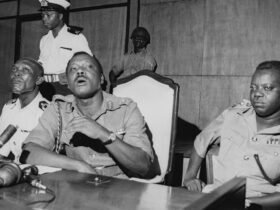
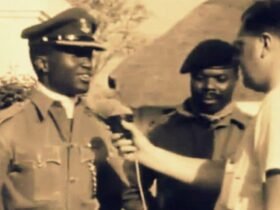

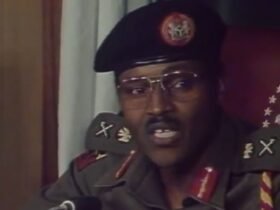
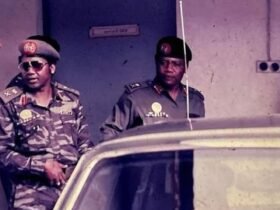
Leave a Reply
View Comments